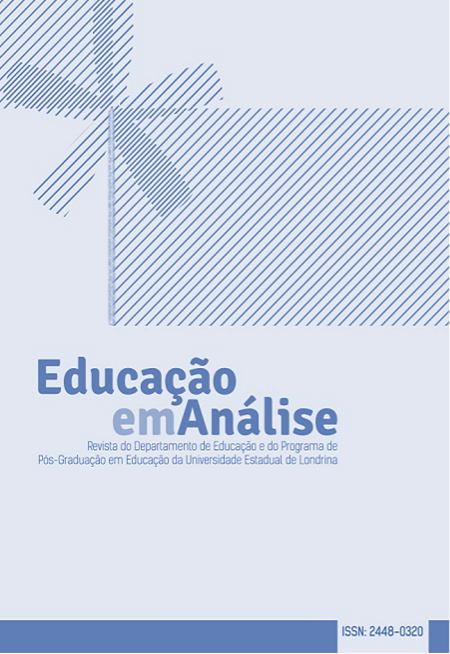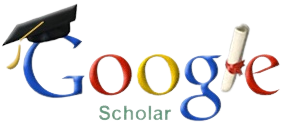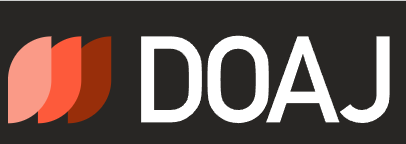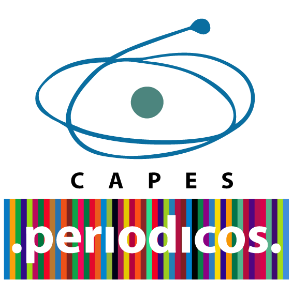Boy or girl?: planejando um objeto de aprendizagem digital no TeDEd
DOI:
https://doi.org/10.5433/1984-7939.2019v4n1p103Keywords:
Digital learning objects, Foreign languagesAbstract
This article reports/analyzes a set of activities produced for the course Digital Learning Objects in Foreign Language Classes taught in 2016 at the Professional Master of Foreign Language Teaching (MEPLEM) in the State University of Londrina. Our goal is to present the stages of planning a Digital Learning Object (DLO) entitled Boy Or Girl? that explored the potentialities of TedEd and aspects of gender identity. From this experience, we intend to analyze potentialities and problems involved in the creation of DLO for teaching English in high school. This is a qualitative study in which we will develop a thematic analysis (BRAUN; CLARKE, 2006) in order to identify, analyze and report patterns within the data from the theoretical framework that supported this production: Computerized Learning Environments (COSTA; OLIVEIRA, 2004), Educational Technology (MATTOS, 1997; MAGGIO, 1997), Digital Literacy (MARTIN, 2008; ESHETALKALAI, 2004), Digital Learning Objects (WILEY, 2002; SILVA, 1998) and Digital Repositories (SCHWARZELMÃœLLER; ORNELLAS , 2006; SANTOS, 2013).
Downloads
References
BRASIL. Ministério da Educação. Fundo Nacional de Desenvolvimento da Educação. Programa um computador por aluno (PROUCA). 2017b. Disponível em: http://www.fnde.gov.br/programas/proinfo/eixos-de-atuacao/programa-um-computador-por-aluno-prouca. Acesso em: 15 ago. 2019.
BRASIL. Ministério da Educação. Proinfo: apresentação. 2018. Disponível em: http://portal.mec.gov.br/secretaria-de-educacao-a-distancia-sp-2090341739/programas-e-acoes?id=244. Acesso em: 15 ago. 2019.
BRAUN, V.; CLARKE, V. Using thematic analysis in psychology. Qualitative Research in Psychology, London, v. 3, n. 2, p. 77-101, 2006.
COSTA, J. W.; OLIVEIRA, M. A. M. Ambientes informatizados de aprendizagem. In: COSTA, J. W.; OLIVEIRA, M. A. M. (org.). Novas linguagens e novas tecnologias: educação e sociabilidade. PetroÌpolis, RJ: Vozes, 2004. p. 111-138.
ESHET-ALKALAI, Y. Digital Literacy: a conceptual framework for survival skills in the digital era. Journal of Educational Multimedia and Hypermedia, Charlottesville, v. 13, n. 1, p. 93, 2004.
ESPURI, P. H. A Política do tablete educacional no ensino de inglês em escolas do Estado do Paraná. In: CONGRESSO LATINO-AMERICANO DE FORMAÇÃO DE PROFESSORES DE LÍNGUAS, 6., 2017, Londrina. Anais [...]. São Paulo: Blucher Education Proceedings, 2017. Disponível em: http://www.proceedings.blucher.com.br/article-details/a-poltica-do-tablete-educacional-no-ensino-de-ingls-em-escolas-do-estado-do-paran-25511. Acesso em: 15 ago. 2019.
IEEE - Institute of Electrical and Electronic Engineers. Learning technology standards committee. Draft standard for learning object metadata version 6.1. 2001. Disponível em: http://ltsc.ieee.org/doc/. Acesso em: 15 ago. 2019.
LOUREIRO, V. J. S. A aquisição do espanhol instrumental na plataforma Moodle. Anais do Encontro Virtual de Documentação em Software Livre e Congresso Internacional de Linguagem e Tecnologia Online, Belo Horizonte, v. 4, n. 1, p. 1-6, jun. 2015. Disponível em:http://www.periodicos.letras.ufmg.br/index.php/anais_linguagem_tecnologia/article/view/8486/7467. Acesso em: 15 ago. 2019.
MAGGIO, M. O campo da tecnologia educacional: algumas propostas para a sua reconceitualização. In: LITWIN, E. (org.). Tecnologia educacional: política, histórias e propostas. Porto Alegre: Artes Médicas, 1997. p. 12-22.
MARTIN, A. Digital literacy and the "digital society". In: LANKSHEAR, C.; KNOBEL, M. (ed.). Digital literacies: concepts, policies and practices. New York: Peter Lang, 2008. p. 151-176.
MATTOS, M. Aprendizagem e tecnologia educacional. Separata de: Revista Tecnologia Educacional, Rio de Janeiro, v. 22, n. 125, p. 8-11, jul./ago. 1997.
PARANÁ. Secretaria da Educação. Diretrizes para o uso de tecnologias educacionais. Curitiba: SEED, 2010. (Série Cadernos temáticos). Disponível em: http://www.educadores.diaadia.pr.gov.br/arquivos/File/cadernos_tematicos/diretrizes_uso_tecnologia.pdf. Acesso em: 15 ago. 2019.
PARANÁ. Secretaria da Educação. Programas e projetos conectados 2.0. Dia a Dia Educação, Curitiba, 2019. Disponível em: http://www.gestaoescolar.diaadia.pr.gov.br/modules/conteudo/conteudo.php?conteudo=1731. Acesso em: 15 ago. 2019.
PARANÁ. Secretaria de Estado da Educação do Paraná. Diretrizes curriculares da educação básica língua estrangeira moderna. Curitiba: Secretaria de Estado da Educação do Paraná, 2008.
SANTOS, A. I. Recursos educacionais abertos no Brasil: o estado da arte, desafios e perspectivaspara o desenvolvimento e inovaçãosão. São Paulo: CETIC.br, 2013.
SCHWARZELMULLER, A.; ORNELLAS, B. Os objetos digitais e suas utilizações no processo de ensino-aprendizagem. In: CONFERENCIA LATINO AMERICANA DE OBJETOS DE APRENDIZAJE, 1., 2006, Guayaquil. Anais [...]. Guayaquil: [s.n.], 2006.
SILVA, C. Bases pedagógicas e ergonômicas para concepção e avaliação de produtos educacionais informatizados. 1998. Dissertação (Mestrado em Engenharia de Produção) - Universidade Federal Santa Catarina, Florianópolis, 1998.
TEDED. Lessons worth sharing: create a lesson. 2019a. Disponível em: https://ed.ted.com/lessons. Acesso em: 15 ago. 2019.
TEDED. The mathematics of sidewalk illusions: Fumiko Futamura. 2019b. 1 vídeo (4m 54s). Disponível em: https://ed.ted.com/lessons/the-mathematics-of-sidewalk-illusions-fumiko-futamura#watch. Acesso em: 15 ago. 2019.
WILEY, D. Connecting learning objects to instructional design theory: a definition, a metaphor, and a taxonomy. In: WILEY, D. The instructional use of learning objects. Bloomington: Agency for Instructional Technology, 2002. p. 1-35.
Downloads
Published
How to Cite
Issue
Section
License
Copyright (c) 2019 Educação em Análise

This work is licensed under a Creative Commons Attribution 4.0 International License.
Os artigos publicados na Revista Educação em Análise estão sob a Licença Creative Commons Atribuição 4.0 Internacional, garantindo Acesso Aberto. Deste modo, os autores mantêm os direitos autorais de seus trabalhos e, em caso de republicação, solicita-se que indiquem a primeira publicação nesta revista. Essa licença permite que qualquer pessoa leia, baixe, copie e compartilhe o conteúdo, desde que a devida citação seja feita. Além disso, autoriza a redistribuição, adaptação e criação de obras derivadas em qualquer formato ou meio, incluindo uso comercial, desde que a atribuição à revista seja mantida.
A revista se reserva o direito de efetuar, nos originais, alterações de ordem normativa, ortográfica e gramatical, com vistas a manter o padrão culto da língua e a credibilidade do veículo. Respeitará, no entanto, o estilo de escrever dos autores. Alterações, correções ou sugestões de ordem conceitual serão encaminhadas aos autores, quando necessário.
As opiniões emitidas pelos autores dos artigos são de sua exclusiva responsabilidade.
























